
Ship container to Portugal



How much does it cost to ship a container to Portugal
Maritime transport rates do not vary only depending on the country of origin and destination, but also because the ports are chosen in each country. iContainers operates in a wide variety of ports worldwide, so you can ship your container to Portugal at the best rate in FCL (full container) or LCL (shared container). Choose a model of maritime transport, select the desired route, and enjoy unbeatable prices!
POPULAR TRADELANES
Shipping rates from/to Portugal
TESTIM0NIALS
What Customers Have To Say
"iContainer´s platform is very user-friendly and provides us with the ease of mind with their automated pre-alerts. We highly recommend their services and diligent follow-up on rates and shipment status"

Irene Chang
Sales Executive at Transworld GLS
iContainers, as a provider, stands out for its level of service and quick responses. They verified the reservation as soon as the operation was opened.

Patrick G. Waddle
General Manager at Advance Global Logistics
The ability of iContainers' platform to provide a quick quote exceeded my expectations. It looked very simple, but at the same time it was exactly what we were searching for.

Yuriy Pukhkalo
Business Development Manager at Prime League Inc.
RATES AVAILABLE
ROUTES TO CHOOSE FROM
PORTS AROUND THE GLOBE
GETTING STARTED
Ship your cargo with iContainers

BOOK the best freight quote of the market

MANAGE your shipment online

TRACK your shipment in real time 24/7
FAQ
FAQs about shipping your container to Portugal
What is the estimated transit time for shipping a container to Portugal?
Estimated transit time to send a container to Portugal can go from 12to 42 days. The main – although not the sole - factor that determines this is the route and distance between the port of origin and the destination port. However, you should also keep in mind there could be unexpected incidents to be faced during transit that could result in delays.
How do you figure out shipping cost to Portugal?
When it comes to having an overall idea of how to calculate your sea freight shipment to or from Portugal, it is important to know that prices vary based on certain factors such as container size, the transit time needed for your shipment, the applicable Incoterm as well as cargo type, weight and dimension. There are, nevertheless, other factors such as special handling of your cargo – an unavoidable request when shipping, say, hazardous goods - that may add to the cost.
FOB vs CIF: What´s the difference?
FOB and CIF Incoterms often generate confusion among shippers, since the agreement terms can sometimes be misleading. The basic difference between the two lies in the extent of the responsibility held by the buyer and the seller. According to the FOB terms, sellers hold liability of the goods until they’re loaded on the vessel. Under CIF, however, sellers hold on to this responsibility until the goods arrive at the destination port.
What type of cargo can be sent in a container?
Standard dry shipping containers – as their name suggests – are suitable for transportation of dry goods and, more specifically, non-perishable goods. This type of container doesn’t include refrigeration or ventilation systems which is why it is not recommended for sensitive cargo but it is available in different sizes, which allows shippers to choose the best container according to the volume of their shipment.
What container capacity do I need for my cargo?
With standardization of containers' dimensions and capacities in dry shipping containers, importers and exporters have an interesting number of options. By way of example, the smallest one (20ft) offers 1,172 CFT / 33.2 CBM of volume capacity while the 45ft HQ – the highest in capacity– is 3,122 CFT / 88.4 CBM. Shippers should nevertheless consider going for a Shared Container (LCL) when not dealing with high-volume cargo.
What paperwork is needed for international shipments to Portugal?
As a general rule of thumb, paperwork required for ocean freight can be sorted into two types: documents that you will invariably have to deal with regardless of the details of your shipment – a Bill of Lading, a commercial invoice or a packing list, for instance – and those that will vary according to aspects such as country-specific formalities or the type of goods involved in the transaction.